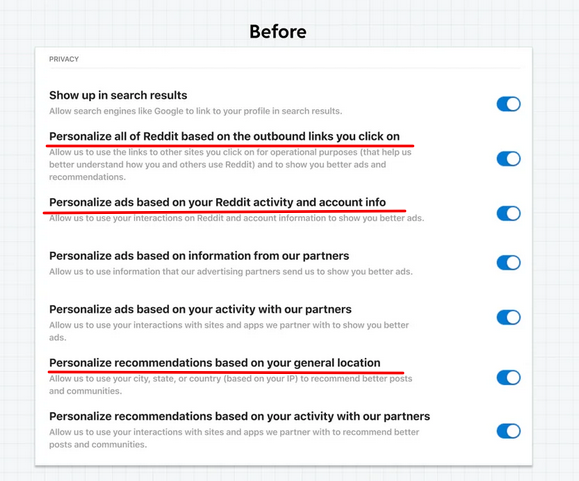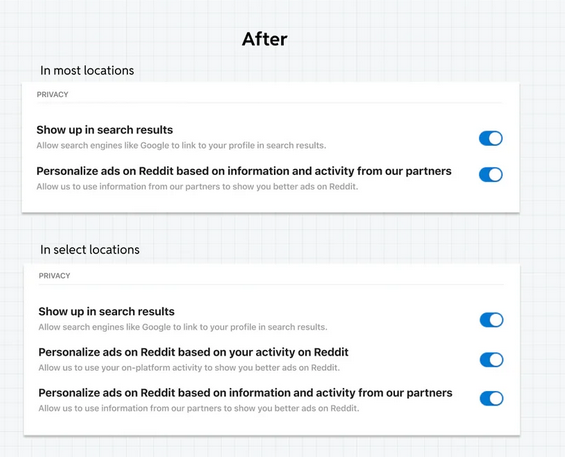AdGuard’s digest: Reddit becomes more ad-friendly, US spy law threatens privacy, as Apple urged to open up
In this edition of AdGuard’s digest: Reddit removes some opt-out options for ads, Amazon puts security behind paywall, Apple is under pressure to open up its closed ecosystem, government watchdog wants to change the old US surveillance law, Meta seeks to (somewhat) unbundle Threads from Instagram.
Reddit removes opt-out option for ad personalization
Reddit has been nothing short of a disappointment this year — the Internet is still low-key reeling from its move to charge third-party developers for using its API, which led to the exit of some of the most popular Reddit clients apps. Back then we speculated that this was because Reddit did not want to miss out on ad money (Reddit could not profit from any ads shown in third-party clients), and it seems like Reddit is willing to trade some more of its reputation for the sake of boosting ad revenue.

The platform has now announced that it is getting rid of the option to opt out of ad personalization based on what you do on Reddit, such as creating posts, joining communities, upvoting and downvoting. The toggles that enabled you to do that simply vanished from the new privacy settings design. Reddit said that the option to opt out of ad personalization based on your activity on the platform will remain only in “select locations,” which are still unknown.

Before

After
On a positive note, Reddit said it would give users the option to see “fewer” (sic) ads from certain sensitive categories, such as alcohol, gambling, pregnancy, and weight loss.
While Reddit claims that its decision to remove the ability to opt-out of some of ad personalization won’t affect user experience much, it is not so simple. Users may still see the same number of ads, but they will be highly-targeted — and with it comes that creepy feeling of being stalked around the Web. More importantly, while before we could at least hope that by opting out of some ad personalization we were preventing Reddit from collecting more of our personal data, now even the illusion of control is lost. User data collection on steroids is the direction Reddit is seemingly heading to, and so it gets another downvote from us.
Amazon locks some of Alexa’s security features behind paywall
We are the kind of privacy-obsessed people who are wary of voice assistants listening to you all the time and sharing the recorded data with vendors. But it’s obvious that voice assistants are also great helpers. For one thing, Alexa’s ability to detect smoke and CO was one of many useful features available to all users. But not for much longer.
Amazon has announced that it will be putting these features, as well as glass break sound detection, behind a paywall, The Verge reported. They were previously part of the standard feature set of Amazon Echo devices, but will require a subscription starting in October 2024. The fee would start at $5.99 and remain that way for Amazon Prime members, while for the general public it would rise to $14.99 per month after a grace period.
This is a disappointing move by Amazon, especially since it leaves Alexa users not just without another gimmick, but potentially life-saving features. Unlike some other pretty much useless features (enter those annoying “by the way” suggestions), these could actually save lives and property. With this in mind, Amazon’s mission statement: “to be Earth's most customer-centric company” — is starting to sound increasingly like a joke.
EU urges Apple to finally open its walled garden to rivals
The EU has once again demanded that Apple opens up its closed ecosystem to competitors. EU industry chief Thierry Breton signaled that Apple needs to hurry up to make itself compliant with the EU’s new competition law, DMA, which targets “gatekeepers” of the digital economy.

Breton said that iPhone users should have the freedom to choose from different services for their electronic wallet, browser, and app store, instead of being locked into Apple’s own products. What it means in practice is that the EU expects Apple to let users use alternative electronic wallets such as PayPal or Venmo, instead of just Apple Pay. They should also be able to try browsers other than Safari (not the worst option by any means, but having choice is important). And they should be able to download apps from alternative sources, such as independent third-party stores like F-Droid or a developer’s website (which Android users already can do). While Apple insists that its ecosystem needs to stay closed because of its high security and privacy standards, Breton disputed this claim, saying that the DMA does not compromise security or privacy.
Apple has been officially designated as one of the six gatekeepers (along with Meta, Microsoft, Amazon, Alphabet, and ByteDance) by the European Commision in September. This means that Apple has to comply with the DMA by 6 March 2024 at the latest. While Apple is resisting the changes, and apparently postponing them till the last minute, they are long overdue. We have long argued that the duopoly of Google and Apple in the app store market is hurting both developers and users through high fees, opaque reviewing practices and inconsistent enforcement of own developer rules. We hope that once all is said and done, and the DMA is in force, the increased competition will urge app stores to vie for apps, and prompt them to reduce fees and improve reviewing procedures.
US watchdog suggests curbing warrantless surveillance… at long last
The Privacy and Civil Liberties Oversight Board (PCLOB), a US federal government panel, has issued a rare criticism of the country’s current surveillance laws. In a split decision, the watchdog found that the notorious Foreign Intelligence Surveillance Act (FISA) “poses significant privacy and civil liberties risks,” as reported by the Wall Street Journal.
The FISA, which expires at the end of the year, has been widely condemned for its Section 702, which allows for spying on foreign nationals, but also sweeps up Americans’ personal information without warrants. The watchdog’s majority did not call for repealing the section, instead suggesting multiple amendments to limit the law’s scope. One of these would require spy agencies to first get a court approval (in most cases) before accessing intercepted data linked to Americans.
This is a welcome sign that the pressure is mounting for the revision of the law, which is fundamentally anti-privacy. The law, which dates all the way back to 1978, is still very much in use by US intelligence agencies. Last year, they conducted a staggering 3.4 million warrantless searches of US citizens’ data, a significant increase from the previous year — it won’t be a mistake to assume that most of these were random, not justified by any security concerns. And it’s our firm belief that this practice of mass surveillance should be relegated to the past, not the present.
Threads to let users delete accounts without losing Instagram
Remember Threads, a text-based social network launched by Meta to great fanfare and now all but forgotten? The network, which has been widely recognized as a “privacy nightmare,” will finally give its users the option to delete their accounts without also nuking their Instagram profiles. The separate account deletion feature for Threads is expected to be available by December.
Previously, users could only deactivate Threads or set it to private, but this would still allow Meta to store and use their Threads data. Threads launched in July with a lot of hype, attracting 100 million sign-ups in a short time. However, since then the platform’s popularity plummeted, and it is estimated to have only 23.7 million monthly users now. It’s also still missing some key features, such as a promised integration with fediverse (a network of decentralized social platforms which also includes Mastodon).
While a delete button is a welcome addition, it does not address many other problems that Threads and other Meta services have, particularly in the area of privacy (we have written what is the problem with Threads’ privacy practices before). So, even if you can delete your Threads account on its own, it’s not much of a consolation.





















































